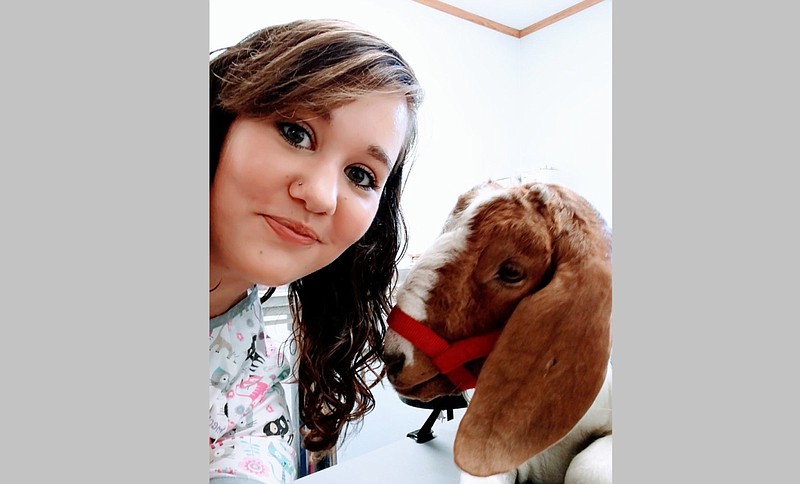When University of Arkansas at Monticello veterinarian Dr. Rocky Lindsey first met UAM pre-vet student Faith Lawrence-Harris, she was extremely shy and timid. As he got to know his student, he could see she was full of "grit."
It's that same grit that has paid off. After three years of repeated applications, Lawrence-Harris recently learned she was accepted into the Louisiana State University School of Veterinary Medicine.
Lawrence-Harris is a 2019 UAM graduate with a degree in animal science and agriculture. She will attend classes this fall at the LSU.
Lawrence-Harris says since she was a little girl crawling under the fence to play with the cows on her grandparents' farm, she knew she wanted to be a veterinarian.
Her father, Gary Lawrence, was the fire chief and EMT in her hometown of Huntington, Ark. He would tell all sorts of medical stories. She would watch "ER" and anything else medically related on TV. She says she initially thought she wanted to work in human medicine, but she found her place with animals. She became active in the local Future Farmers of America chapter and as part of the poultry team. Anything she could find animal-wise, she was doing it.
Lawrence-Harris gave credit to the UAM Agriculture Department. She credits her success to her professors Jason Cater, Rocky Lindsey, and UAM farm manager Greg Montgomery.
"Those are the people who led me this way and never gave up on me," said Lawrence-Harris.
She says they continued to encourage her after graduation.
"They were a phone call away and still there for me. I didn't even have to be a student anymore. They were so determined in my success that they were there for me even after I graduated," she said.
This year she applied to veterinary schools at LSU, Mississippi State, and Lincoln Memorial in Tennessee. She accepted the offer by LSU, which means her out-of-state tuition is covered.
Lindsey says that because Arkansas doesn't have its own veterinary school, the state has made arrangements with neighboring states. He says LSU will accept up to eight students each year. If accepted, Arkansas will then make up the difference for the out-of-state tuition. Other states having contracts with Arkansas include Oklahoma State, Missouri, and Tuskegee.
Mississippi State also has an arrangement, accepting up to four students, but is not obligated to accept any students each year. The out-of-state reimbursement is also different from the other schools. Lindsey says Lawrence-Harris is the second UAM student in two years to be accepted at LSU.
She says the selection pool is competitive. And you never quite know what the school is looking for. Each year is different.
"One year, if you didn't make a 4.0-grade point, you were dropped from consideration. The best you can do is to work your butt off to make the best grade and get the experience to make yourself unique. You need something on your application that makes you stand out," she said.
The first initial cut is grade point average. Some years a student might be able to get in with a 3.3 GPA; other years, it's 4.0. She says recommendation letters are also critical.
Lindsey says the veterinarian field is so competitive that students enroll in medical school because they cannot get into veterinary school.
Ultimately, the 24-year-old Lawrence-Harris wants to be a mixed-practice veterinarian in the small town where she grew up. She would like to work with large and small animals.
"What few veterinarians we have in the rural areas are getting older in age and ready to retire," said Lawrence-Harris. "I'd really like to bring a new veterinary clinic in here, so we still have one. Our rural communities are where you really need your vets."
The big cities have many vet clinics, but the rural communities are really deprived, she said.
Lindsey agrees with Lawrence-Harris. He says the rural area is really underserved.
"There is lots of opportunity for students in a rural area if you are content with that," Lindsey said.
He says "rural area" means that a veterinarian might not have all the big toys that the large practices have.
"I know of five places off the top of my head that if veterinary students who are graduating will go, they'll do well. You have to want to do it," Lindsey said.
Lawrence-Harris learned about UAM through her brother-in-law, who was attending here. Her husband, Jarrett Harris, also attended UAM with a major in criminal justice. He has a semester left and plans to finish up his degree with online classes once his wife completes her veterinary school.
UAM offers pre-veterinary classes. The university gives students practical hands-on experience with cattle. UAM has its own beef operation and working farm. Students will vaccinate, deworm, treat, and handle them.
"Even if you're not interested in working cows, if you learn how to work them, that experience really pops out in an interview or application to vet school. There is not a lot of that out there," said Lindsey.
He says when LSU recruiters are looking for Arkansas students to enroll in their veterinary program, UAM is one of the first places they look.
"The professors I had at the ag department were amazing, and they were steppingstones for me to get where I am. They pushed people's dreams and will do anything to help you," said Lawrence-Harris.
More information about the UAM pre-vet program is available at the UAM College of Forestry, Agriculture and Natural Resources at (870) 460-1052.
Lon Tegels is with the University of Arkansas at Monticello College of Forestry, Agriculture and Natural Resources.

